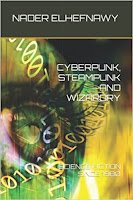There is a tedious predictability to the marketing of reboots--aspects of which tend to be fairly distasteful. One is the denigration of the old version of the franchise for the sake of talking up the new one.
"Didn't you just hate that?" the publicists say in that wheedling way.
Maybe some people didn't care for it. But not all of us. The whole point of the reboot, after all, is to capitalize on that earlier thing's success--which means the affection people had for it, which is also why they are taking this line. Their affection is why the brand name they are cashing in on means something, but their affection for the old version may be a barrier to their accepting a new one. The result is that to effectively exploit that affection they have to divert it--from the old thing to the new one.
Of course, this is not a permanent stance on their part. Because after all this nonsense has been used to establish the new version the franchise-runners go back to mining the old for more coin, the value of nostalgia for the old is too great a thing for them to ignore permanently.
Indeed, just a short time after trying to bury the old version to make way for the new they are apt to use the fondness people still have for the old version to prop up the new, especially when it is not doing so well.
The James Bond franchise, which as the pioneer of the high-concept mode of filmmaking generally, and the action-adventure franchise as we know it in particular, has been on the cutting edge of movie-making and marketing in the past, remains so--pioneering this particular practice.
"Didn't you just hate that?" they said about the original EON Bond films as they tried selling people on the reboot. No, we didn't all hate it. But that was the line they used in promoting the new Daniel Craig versions, and the claqueurs of the entertainment press helped sustain that narrative.
As it happened Casino Royale ended up a hit. But the response to Quantum of Solace, at least to go by the prevailing narrative, was less ebullient. Meanwhile, with MGM in financial trouble (for the umpteenth time, but not the last), the next film was put on hold as people wondered about the survival of the franchise itself. ("Is James Bond dead?" Entertainment Weekly actually asked.)
The franchise-runners were shaken--while the 50th anniversary of the Bond series was coming up fast. And so they made the most of it, making of Skyfall a 50th anniversary movie in an even bigger way than they made of the Easter egg hunt that was the 40th anniversary movie, Die Another Day. They made a big deal about evocations of Bond's past--shifting away from Bond as practically a dude who came "from the street" to go by what Vesper Lynd said in the 2006 film to making him a Scottish blueblood with baggage about his past, and more baggage from the "family dynamics" of the present. ("This time, it's personal.") They brought back the machine gun-packing Aston Martin from the '60s-era films that one would have previously thought simply did not exist in this timeline. And they had the film run with a latterday version of Q and Moneypenny and even an M who is not Sir Miles Messervy, but is at least Miles Messervy-ish, so that as the film closes the office, at least, looks a little more like the one we remember.
Basically they had gone from "Didn't you just hate that?" to "Didn't you just love that?" And if your answer was "No," their answer was "Shut up, of course you did!"
All this is inconsistent, incoherent, insulting to the intelligence--and therefore, I would think, risky. And even where the audience was accepting of the manipulation I would think such comparative minutiae would, at most, matter more to the hardcore fans of the series, not the broad moviegoing public that watches the movies casually, especially the younger members with less memory of the older films, who probably would not know Geoffrey Keen from Robert Brown from Bernard Lee (especially given how, I think, people actually watch action movies). Still, it got people talking, brought the new film a lot of positive press--and when it hit theaters, for whatever reason (correlation is not causation, but all the same, the correlation is pretty striking), the movie overperformed, and massively. The prior two Bond films had made about $600 million each globally--Skyfall over $1.1 billion, which is to say almost as much as the prior two films combined. Indeed, averaging the grosses of the other three pre-pandemic films, or even those three films with No Time to Die, and getting an average gross for a Bond film of about $900 million (adjusted for April 2023 prices), one sees Skyfall's gross approaching an astonishing $1.5 billion instead--suggestive of an overperformance of 50-70 percent.
Selected James Bond Films, 2006-2021 (Current and Consumer Price Index-Adjusted April 2023 U.S. Dollars, Adjusted Figures in Parentheses)
Casino Royale (2006)--Worldwide--$606 Million ($911 Million); North America-$167 Million ($252 Million)
Quantum of Solace (2008)--Worldwide--$590 Million ($830 Million); North America--$168 Million ($237 Million)
Skyfall (2012)--Worldwide--$1.11 Billion ($1.46 Billion); North America--$304 Million ($402 Million)
Spectre (2015)--Worldwide--$881 Million ($1.13 Billion); North America--$200 Million ($256 Million)
No Time to Die (2021)--Worldwide--$774 Million ($865 Million); North America--$161 Million ($180 Million)
Unsurprisingly the franchise-runners stuck with the nostalgic approach, having 007 (once more) battle Ernst Stavro Blofeld and his SPECTRE organization in the sequel. As the numbers cited above indicate, Spectre was not as successful as Skyfall--but got a boost coming right after that film, and perhaps, from its evocation of 007 Past.
Right now the DCEU seems to be following a similar trajectory. When Warner Bros. put out Man of Steel, and still more, revealed the developing outlines of the DCEU in Superman vs. Batman: Dawn of Justice, there seemed no interest on its part in the earlier incarnations of the characters whatsoever. The whole idea was establishing the new universe, without audiences being distracted, or encouraged to draw comparisons that might be unfavorable, perhaps the more in as they went in a controversy-stoking direction (Ben Affleck is probably no one's favorite Batman--and whatever the claqueurs say a lot of people were probably not thrilled with the fascist wacko incarnation of the character he was given to play that time around); and frankly, because the stakes seemed very high, Warner hoping that this would be its very own equivalent of the Marvel Cinematic Universe.
Of course, it did not all go as planned, by a long shot, the DCEU never approaching Marvel's fecundity with films, with those films it did get to put out there failing to achieve its billion dollar hit-regularizing success.
Indeed, Warner decided to give these reboots . . . yet another reboot (because studios no longer give up on franchises, or even let them lie fallow, they rush to reboot them because in this day and age nothing is more repugnant to a Hollywood Suit than a New Idea).
Prior to this all becoming official the struggling DCEU Universe's runners, like the runners of the Bond franchise, started seeing nostalgia less as a threat to their new wares and more as a prop to them. Thus did the decision to have Michael Keaton play Bruce Wayne/Batman as part of the last DCEU films, a Skyfall-like evocation of franchise past to aid it in the present. Indeed, such nostalgic evocation seems to be the best thing The Flash has going for it, just as it was the best thing Skyfall had going for it, as the press buzzes over it.
Again, this seems to me something more relevant to fans than the broader audience. It also seems more relevant to American fans than their foreign counterparts--for whom there may be no nostalgia to exploit, with the result that the gesture will fall flat. (Consider how the deeply nostalgia-dependent effort to sell Star Wars in China, which missed out on the original release of the trilogy, fell flat in another reminder of Disney's inability to understand and market its own product--"smartest guys in the room" indeed.) This is all the more the case given that, in contrast with the longstanding, vast, global audience for the Bond films there is probably less nostalgia for anything so specific as, say, the Tim Burton Batman films. Still, this is a possible source of surprises here--and if it (or anything else) ends up working in favor of The Flash becoming a blockbuster, expect the entertainment press to get more bullish still in its predictions about what the movie will make in its opening weekend.
Book Review: Providence by Max Barry
7 hours ago







